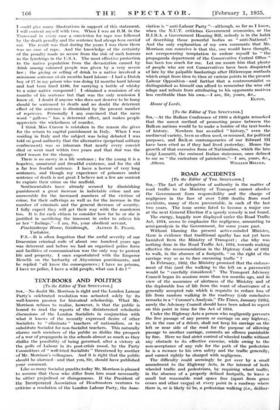TEXT-BOOKS AND POLITICS [To the Editor of TELE SPECTATOR.] Sin,—No
doubt Mr. Morrison is right and the London Labour Party's celebrated resolution was actuated solely by its well-known passion for historical scholarship. What Mr. Morrison refuses to realize, however, is that the public is bound to read the reports of the disinterested scholastic .discussions of the London Socialists in conjunction with what it knows of the recently expressed desire of other Socialists to " eliminate " teachers of nationalism, or to substitute Socialist for non-Socialist teachers. This naturally alarms such members of the public as dislike the prospect of a war of propaganda in the schools almost as much as they dislike the possibility of being governed, after a victory at the polls of Labour in its post-crisis mood, by the Party Committees of " well-tried Socialists " threatened by another of Mr. Morrison's colleagues. And it is right that the public should be alarmed—and that you, Sir, should have published your comment.
Like so many Socialist pundits today Mr. Morrison is pleased to assume that those who differ from him must necessarily be either prejudiced or disingenuous. If the President of the Incorporated Association of Headmasters ventures to - criticize a resolution of the London Labour Party, the Asso-
elation is " anti-Labour Party "—although, so far as I know, when the N.U.T. criticizes Government economies, or the R.I.B.A. a Government Housing Bill, nobody is in the habit of describing those powerful bodies as " anti-National." And the only explanation of my own comments that Mr. Morrison can conceive is that the, one would have thought, not overpowering temptation to endear myself to " the propaganda department of the Conservative Central Office " has been too much for me. Let me assure him that plenty of people who are not Conservatives have been disquieted of late by the palpable hankerings after Hitleresque methods which erupt from time to time at various points in the present Labour Opposition—and further that a controversialist so distinguished as himself can afford to remember the wise old adage and refrain from attributing to his opponents motives less creditable than his own.—I am, Sir, yours, &c.,














































 Previous page
Previous page